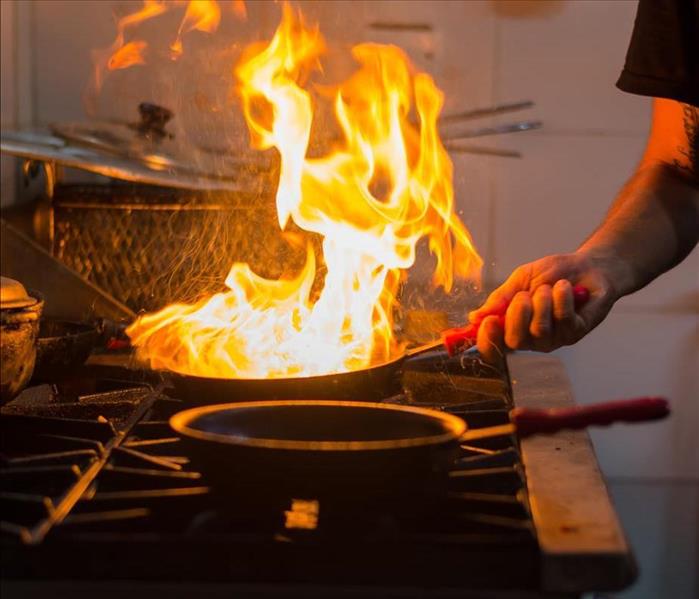Reduce the Risk of Fire in the Kitchen
9/6/2021 (Permalink)
National Fire Protection Association (NFPA) says 6 out of 7 cooking fires occurred while the cook was out of the kitchen, and 2/3rds of these fires happened in the first 15 minutes of cooking. This means that it is imperative that you ALWAYS watch what you’re cooking. If you’re using the stovetop, stay in the kitchen and watch closely. Also, experts recommend setting a timer periodically to remind you to check the oven.
OTHER FIRE PREVENTION TIPS INCLUDE
- Roll up sleeves and don’t wear loose fitting clothing that could catch and open flame or heating element
- Ban children and pets from a 3-foot “safe zone” around the stove
- Keep the stove and oven clean, turn pot handles in to avoid spills and cleanup any messes when appropriate
- Keep potholders, dishtowels, oven mitts, food packaging and other clutter off and away from the stove.
- Clean cooking equipment thoroughly because built-up grease can catch fire.
- Don’t over heat your oils, and wait for grease to cool before disposing, tossing hot grease in a trashcan could turn into a disaster
Smoke detectors are your first line for defense against a fire disaster situation so make sure you have one installed in or near the kitchen and make sure it’s working properly.
IF A FIRE DOES HAPPEN, CONSIDER THESE SAFETY TIPS
- Close the door behind you to help contain the fire and get out of the house.
- Call 9-1-1 or the local emergency number after you leave.
- For an oven fire, turn off the heat and keep the door closed.
- Keep a lid nearby when you’re cooking to smother small grease fires. Smother the fire by sliding the lid over the pan and turn off the stovetop. Leave the pan covered until it is completely cooled.
People often try to put out cooking fires themselves with a fire extinguisher or even water. NEVER use water on any grease fire. Store fire safety equipment in a cabinet or under the sink – it is important to have a fire extinguisher close by as well as a box of baking soda or salt for grease fires. The first step you can take is turning the stove off and having a lid handy to put over the pan. You can also smother the fire with baking soda or salt. If the fire is in your oven just close the door and turn off the heat. Done improperly your cooking fire can spread to other parts of the kitchen. Any time you are unsure of how to combat a fire your best option is to leave and call your local fire department!
CREATE AND PRACTICE A FIRE ESCAPE PLAN
In the event of a fire, remember that every second counts, so you and your family must always be prepared. Escape plans help you get out of your home quickly.
Practice your home fire escape plan at least twice a year, more often if you have small children.
Some tips to consider when preparing this plan include:
- Find two ways out. Visit each room of your house and find two ways out, including windows and doors. Make sure all escape routes open easily so you can get outside, and install emergency release devices on any security bars on doors or windows. Practice feeling your way out in the dark and with your eyes closed.
- Involve children in planning. Consider having your children help create a fire evacuation plan. Draw a map of the home and have children mark two exit routes and the locations of smoke detectors. Make sure your children know NOT to hide from firefighters or other first responders.
- Choose a meeting spot. Decide on a meeting place outside, such as a neighbor’s house, mailbox or stop sign. It should be in the front of the house so emergency responders can see you when they arrive. Agree not to go back into the house after you leave.
- Have a backup plan. If the planned exit routes are blocked and it’s not possible to leave the house, close all doors between you and the fire. Place a towel under the door and go to an exterior-facing window. Call the fire department to report your location.
Whether you’re trying a new cooking technique or cooking your signature dish the way you have countless times before; practicing these important safety tips can help you to avoid major mishaps that could lead to smoke or fire damage.
If your home does experience fire or smoke damage, give SERVPRO of Champaign/Urbana a call at 217-355-0077.





 24/7 Emergency Service
24/7 Emergency Service
